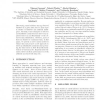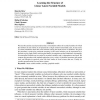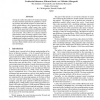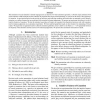115
click to vote
CORR
2012
Springer
13 years 9 months ago
2012
Springer
Discovering causal relations among observed variables in a given data set is a main topic in studies of statistics and artificial intelligence. Recently, some techniques to disco...
118
click to vote
JMLR
2010
14 years 8 months ago
2010
We present an algorithm to infer causal relations between a set of measured variables on the basis of experiments on these variables. The algorithm assumes that the causal relatio...
135
click to vote
COMPSAC
2010
IEEE
15 years 1 days ago
2010
IEEE
In distributed IT systems, replication of information is commonly used to strengthen the fault tolerance on a technical level or the autonomy of an organization on a business level...
135
click to vote
COGSCI
2004
15 years 1 months ago
2004
Previous research suggests that children can infer causal relations from patterns of events. However, what appear to be cases of causal inference may simply reduce to children rec...
139
click to vote
JMLR
2006
15 years 2 months ago
2006
We describe anytime search procedures that (1) find disjoint subsets of recorded variables for which the members of each subset are d-separated by a single common unrecorded cause...
109
click to vote
IJCAI
1997
15 years 3 months ago
1997
Aiming at explicit description of temporal meaning of causal relations generated by qualitative reasoning systems, this article proposes a causal time ontology which defines a se...
116
click to vote
IJCAI
2003
15 years 3 months ago
2003
We introduce a logical formalism of irreflexivc causal production relations that possesses both a standard monotonic semantics, and a natural nonmonotonic semantics. The formalism...
107
click to vote
LREC
2008
15 years 3 months ago
2008
While recent corpus annotation efforts cover a wide variety of semantic structures, work on temporal and causal relations is still in its early stages. Annotation efforts have typ...
118
click to vote
LREC
2010
15 years 3 months ago
2010
The annotation of causal relations in natural language texts can lead to a low inter-annotator agreement. A French corpus annotated with causal relations would be helpful for the ...
121
click to vote
ACL
2008
15 years 3 months ago
2008
Finding temporal and causal relations is crucial to understanding the semantic structure of a text. Since existing corpora provide no parallel temporal and causal annotations, we ...





